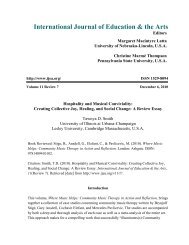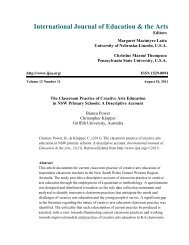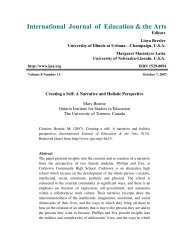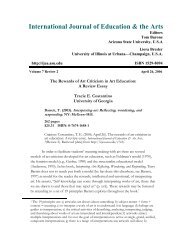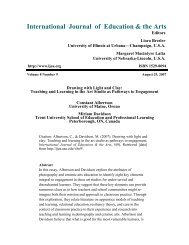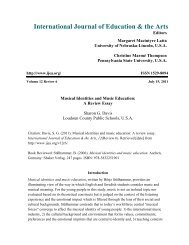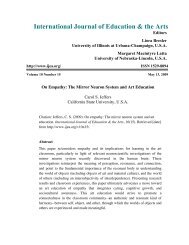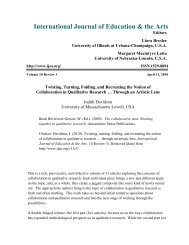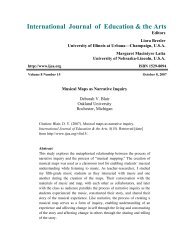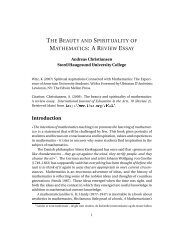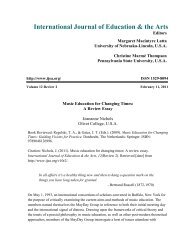Experiences with poetry, pedagogy and participant observation ...
Experiences with poetry, pedagogy and participant observation ...
Experiences with poetry, pedagogy and participant observation ...
- No tags were found...
Create successful ePaper yourself
Turn your PDF publications into a flip-book with our unique Google optimized e-Paper software.
International Journal of Education & the Arts Vol. 7 No. 1 8towards simply coming together to discuss <strong>and</strong> get feedback on our own work. Preparationwas not needed to keep things going or to stimulate discussion, <strong>and</strong> while I would bringquestions to meet my own agenda, I also became, frankly, much more interested in reading<strong>and</strong> learning about students’ work <strong>and</strong> writing processes. While a more structured – writethis, try that, now this model, now that format – style would have created data that was easier toanalyze, as a pilot project, it seemed important to let students take their writing <strong>and</strong> take mewherever everything naturally needed to go. In this way, no one was writing “for theteacher” or writing towards research goals, nor were we forcing inspiration to mould itselfto a given path, which hopefully will translate into a better-conceived second phase of thisproject.The Process: Writing <strong>Experiences</strong> into PoetryWhat sorts of things happened in this process? As we all wrote our experiences inMexican culture into <strong>poetry</strong> (<strong>and</strong> in one case, prose), many interesting issues emerged. Thethree themes that I will discuss here each show that <strong>poetry</strong> writing <strong>and</strong> discussing producedqualitative data about students’ experiences in Mexican culture (which has qualitativeresearch interest); produced new relationships <strong>with</strong>in the students-culture-teacher triad(which is the critical <strong>and</strong> pedagogical interest), <strong>and</strong> lead us to new reflections about creativewriting as a way to represent experiences in another culture (which is the anthropologicalor representation interest). These three interests will be woven into the discussion of eachtheme.Insight into the first person – third person question: “Writing at arm’s length”One of the most relevant discussions that developed from student writing focusedhow close <strong>and</strong> in what ways writing allowed us into the experience of an Other. Thequestions I most hoped to get answered – could we find new in-roads to empathy? – <strong>and</strong> couldwe/should we represent the Other in the first person? – did not get fully answered, in part, becausethey are so complicated, <strong>and</strong> in part, because somewhat against my expectations, the <strong>poetry</strong>group did not provoke a large quantity of writing from other viewpoints. Only one poemwas written in the first person about a local community member, <strong>and</strong> only a few poemswere written explicitly about local views even in the third person, which students statedthat they viewed as a safer way of writing about the Other since it still acknowledged thecultural <strong>and</strong> personal distance between writer <strong>and</strong> subject.However, while there were few first-person poems, these few were exceedingly welldone. For example, one student wrote a poem entitled “Low Visibility,” from the point ofview of a woman sitting on the street begging.Low VisibilityThe empty cup of my h<strong>and</strong>means nothing to you;the dusted rust of my complexionis one you feelslyly corroding a deep hole,



